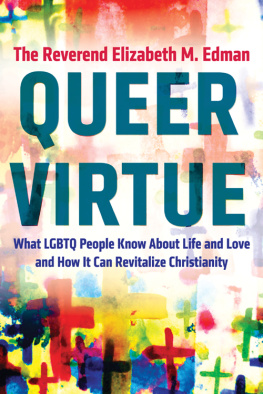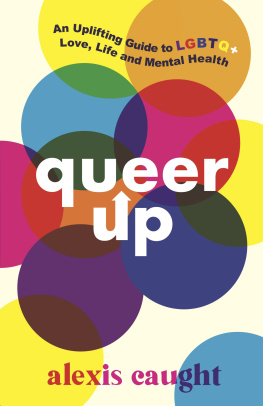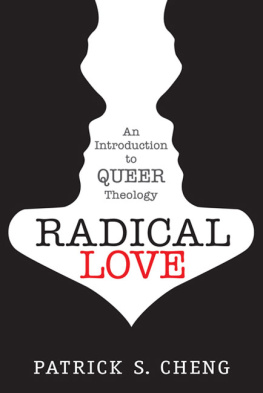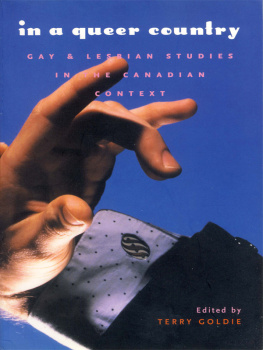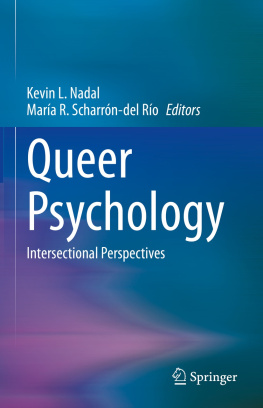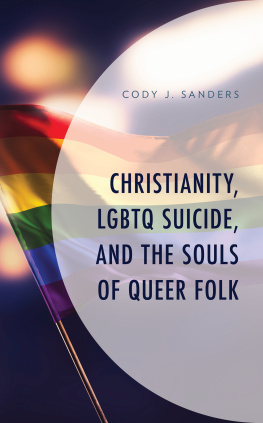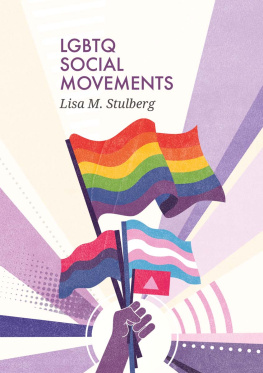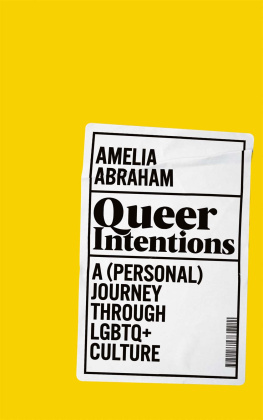QUEER IDEAS
Loves Promises: How Formal and Informal Contracts Shape All Kinds of Families, by Martha Ertman
Gaga Feminism: Sex, Gender, and the End of Normal, by J. Jack Halberstam
Queer (In)Justice: The Criminalization of LGBT People in the United States, by Joey L. Mogul, Andrea J. Ritchie, and Kay Whitlock
A Queer History of the United States, by Michael Bronski
God vs. Gay? The Religious Case for Equality, by Jay Michaelson
From the Closet to the Courtroom: Five LGBT Rights Lawsuits That Have Changed Our Nation, by Carlos Ball
Beyond (Straight and Gay) Marriage: Valuing All Families under the Law, by Nancy D. Polikoff
QUEER ACTION
You Can Tell Just By Looking: And 20 Other Myths about LGBT Life and People, by Michael Bronski, Ann Pellegrini, and Michael Amico
Family Pride: What LGBT Families Should Know about Navigating Home, School, and Safety in Their Neighborhoods, by Michael Shelton
Out Law: What LGBT Youth Should Know about Their Legal Rights, by Lisa Keen
Come Out and Win: Organizing Yourself, Your Community, and Your World, by Sue Hyde
For Michael+
that suffering which I showed unto thee and the rest in the dance, I will that it be called a mystery.
A NOTE FROM THE SERIES EDITOR
The words queer and virtue hardly ever appear together. Like alpha and omega, sin and grace, and wrong and right, they are always seen as opposing ends of a spectrum. Elizabeth Edmans Queer Virtue: What LGBTQ People Know AboutLife and Love and How It Can Revitalize Christianity brilliantly, succinctly, and with enormous empathy and insight argues that these terms, far from being oppositional, are wedded in ways that make them distinctly unique. Indeed, brought together they are the quintessence of Christianity.
The last four decades, since the advent of Gay Liberation in 1969, have produced a wealth of literature dealing with the troubled, ever-evolving relationship between feminism, (homo)sexuality, and Christianity: Mary Dalys revolutionary Beyond God the Father: Toward a Philosophy of Womens Liberation (1973), John Boswells Christianity, Social Tolerance, and Homosexuality: Gay People in Western Europe from the Beginning of the Christian Era to the Fourteenth Century (1980), Mark D. Jordans The Invention of Sodomy in Christian Theology (1997), and Patrick S. Chengs From Sin to Amazing Grace: Discovering the Queer Christ (2012) all gave us fresh ways to think about how historically and theologically the relationship between Christianity and queerness is far more complex than we had ever imagined. Queer Virtue builds on these works and takes them a step furtherif modern Christianity is in a crisis, it can be saved, revitalized, by the contemporary queer experience and consciousness. Edmans vision challenges and reawakens Christianity from the inside and forces believers and nonbelievers alike to rethink and reanimate their long held assumptions.
We live in a country in which the lived experience of being LGBTQ and the internal experience and practice of being Christian seem to continually clash: same-sex marriage debates, religious freedom exemptions, the implications of antigay sentiments, and the limits of hate crime laws are in the headlines every day. Queer Virtue addresses none of this directlyand yet, with theological and political perceptivity, Edman gives us new ways to think about all of these issues by demanding that we understand queerness not as compatible with Christianity, but an embodiment of it.
MICHAEL BRONSKI
Series Editor, Queer Action/Queer Ideas
AUTHORS NOTE
This book is born of three decades of studying, preaching, and teaching from the western canon of Christian scripture. This canon includes the Hebrew/Jewish scriptures that were sacred texts for Jesus, Paul, and the communities that Paul founded; the four synoptic Gospels; the Acts of the Apostles; numerous epistles including those attributed to Paul; the book of Revelation; and for some denominations, the books of the Apocrypha. Therefore, when I use the term Christianity in this book, I refer to those strands of the Christian tradition whose traditional sacred texts are those of the Western canon. My understanding of what constitutes core theology in this Western tradition is informed by the work of the councils of the fourth through the ninth centuries CE. By Christian, I thus include Roman Catholicism, Anglicanism, other Protestant denominations often referred to in the United States as mainline (Lutherans, Methodists, Presbyterians, etc.), and evangelical Protestantism. I would also include progressive faith communities such as the Unitarian Universalists and Quakers to the extent that such communities or members consider themselves Christian.
There are thus many strains of Christianity that are not included in my scope, including Eastern Orthodoxy and esoteric strains of Christianity such as Gnosticism. In some ways I suspect that these traditions are able to embrace the liminality of the sacred with greater ease than Western Christianity; however, lacking expertise in these traditions, I leave it to others to discuss whether they can be described as inherently queer.
Of those Christian traditions that fall within my scope, all are global movements, and I offer the ideas in this book for consideration by their full global communities. My intention here is not to universalize a single, decisive interpretation of Christianity and impose it on people who live in contexts and experience modes of worship very different from what I experience as an American of European descent. With love and respect, I thus defer to my Christian siblings across the globe to articulate how the queerness of our tradition is manifest for them, undoubtedly in ways that I have not yet comprehended.
I occasionally refer broadly to the church. This term refers to the global community of faith, characterized in the Nicene Creed as one holy catholic and apostolic. Within this church there is considerable breadth of opinion about issues raised in this book. Therefore it matters to underscore this point: there are many Christian denominations that now recognize the inherent worth of LGBTQ people. Several denominations have long been prophetic on this front, including the United Church of Christ, Unitarian Universalists, Quakers, and my own Episcopal Church. The Metropolitan Community Church has been positively heroic in its proclamation of a queer-positive gospel. I hold in highest regard the countless clergy and laypeople, queer and nonqueer, who over the past fifty years have promoted LGBTQ justice in Christian churches globally. Many LGBTQ clergy are now bringing their queerly attuned gifts to bear in ways that invigorate congregations graced by their leadership. Thus I acknowledge with respect and gratitude the existence of queer-positive individuals and denominations even as I write about homophobic strains of Christianity; and I do not in any way mean to imply that Christianity is universally homophobic when I write that many homophobic enterprises call themselves Christian.
One term that I use is nominal Christianity. By this I simply mean people and communities who call themselves Christian, regardless of where those individual people or churches land on the ideological spectrum. Nominal Christianity is not meant to be a disparaging term in itself, but a simple and neutral way to say thats who they say they are. When I talk about authentic Christianity, I am referring to a lived faith in keeping with the ancient tradition that has been handed down in the Western canon of scripture and from the early (especially pre-sixth-century) church. In keeping with the ancient tradition is of course quite a broad description. None of our communities lives it perfectly, and there are aspects of this tradition that a socially conservative congregation might live more authentically than a socially progressive one. I will therefore focus tightly on one specific aspect of authentic Christianity as a spiritual journey that prioritizes the ancient Christian impulse to rupture simplistic binaries, especially those pertaining to the relationship between Self and Other.

